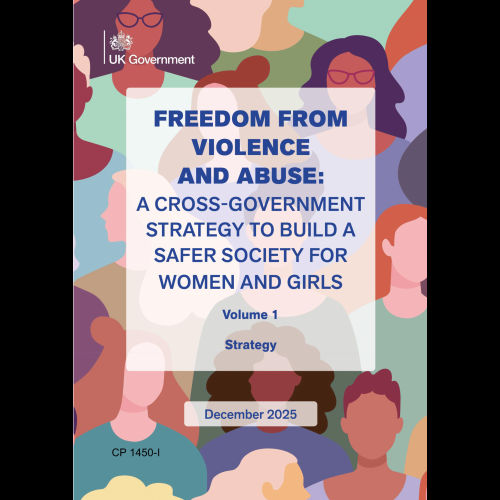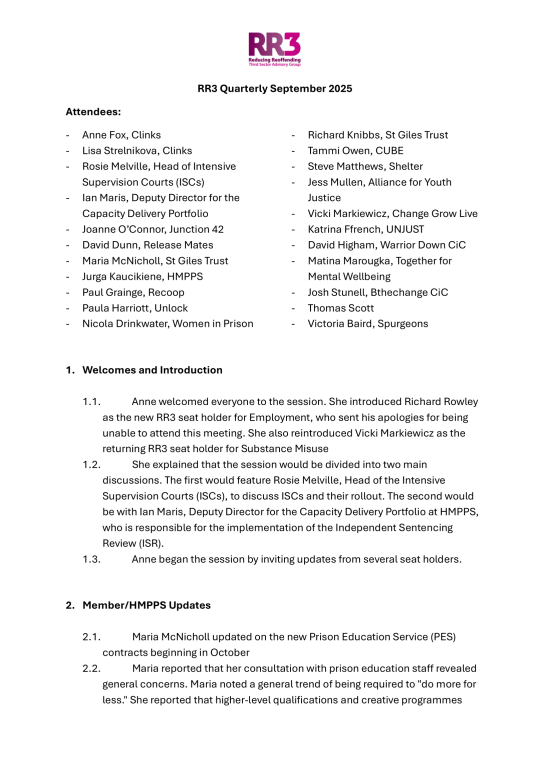The Ministry of Justice (MoJ) and Her Majesty’s Prison and Probation Service (HMPPS) Third Sector Task Force formally asked the Reducing Reoffending Third Sector Advisory Group Covid-19 Special Interest Group (RR3 SIG) to produce a think piece presenting the voluntary sector’s views on the recovery of voluntary services in the criminal justice system after the pandemic.
Clinks commissioned Russell Webster to co-ordinate the think piece on behalf of the RR3 SIG. The report is based on the views of the group’s members and those of organisations in their networks, as well as information gathered from Clinks’ engagement with over 850 people through 85 online events in the past few months. In this blog, Russell Webster summarises its main contents and you can read the piece in full here.
Key principles
The paper highlights six principles the voluntary sector sees as critical to responding to the challenges of Covid-19 and creating a fairer and more effective post-pandemic criminal justice system:
- A full and equal partnership between the criminal justice voluntary sector and the MoJ and HMPPS, which enables all of us to act as critically constructive friends
- Our belief in the importance of transparency on both sides
- The importance that both the emergency responses to Covid-19 and the construction of a new normal within the criminal justice system reflect the detailed and continuing input of people with lived experience of that system
- The importance of a holistic approach across government departments and sectors, particularly around issues relating to physical and mental health, employment, benefits and housing
- Consistency across the prison estate and the national probation landscape. Voluntary organisations were concerned at the very different Covid-19 responses between apparently similar prisons and probation areas
- Recovery is an opportunity to learn how to make the system work better for the men, women and children it works with.
Impact on the voluntary sector
Clinks and the RR3 SIG have already described in some detail the devastating impact of coronavirus and the associated lockdown on voluntary sector organisations working with people in contact with the justice system, with smaller and black, Asian and minority ethnic (BAME) charities disproportionately affected.
The voluntary sector has, however, responded to diverse challenges at every stage of the justice system via a wide range of adaptations and innovations. The document highlights a number of key challenges, responses and persisting barriers in six areas:
- Safe working practices to protect workers, volunteers and service users from Covid-19
- Work in prisons (including both group work and one-to-one work)
- Work with the families of prisoners
- Through the gate work
- Work with people subject to probation supervision and community (including access to accommodation and employment)
- Work with groups who are medically vulnerable and at particular risk from Covid-19.
Please refer to the report (pages 8-14) for full details of emerging best practice in these areas.
The RR3 SIG also raises the issue of the disproportionate impact of Covid-19 on people from BAME backgrounds in particular and notes its disappointment that this disproportionate impact was not mentioned in either the National Framework for Prison Regimes and Services nor the Probation Roadmap to Recovery and that there appears to be no equality impact assessment of either document. The group also highlights a number of other groups whose specific needs appear to be overlooked, including women; Gypsy, Roma and Traveller people; and care leavers (many of whom lack family members who are able to support or advocate for them).
In a separate paper, voluntary organisations have set out areas for action that HMPPS must take in order to address the challenges of BAME-led organisations as the criminal justice system recovery process continues. The RR3 has given its full support to the paper, in a letter to Dr Jo Farrar, Chief Executive of HMPPS. Read the paper and supporting letter here.
Putting service users first
The RR3 SIG argue strongly that input from people with lived experience of the criminal justice system is absolutely essential to successful recovery planning and that the prison system often actively obstructs contributions from people with lived experience.
The group suggest that MoJ/HMPPS could enable people in prison to be more active players in their resettlement planning by building on the emergency provisions to make in-cell communication a priority. Mainstreaming video visits, improving access to free/low cost family contact through technology and allowing secure internet access are all thought to be vital components of a more effective new normal.
The RR3 SIG argue that both overall prisoner wellbeing and equality issues should be on an equal footing with safety and security in the prison and probation roadmaps to recovery, and that this is not yet the case. The group also recommends that HMPPS considers rolling out programmes that foster better staff/prisoner relationships.
What next?
As well as writing the document, Clinks and other members of the RR3 SIG have presented the report to HMPPS and received a positive response from senior officials keen to benefit from the (unwanted) opportunity of coronavirus to develop a more effective and fairer criminal justice system. Look out for developments in Light Lunch.
Photo: © Andrew Aitchison
What's new
Blogs
Violence Against Women and Girls (VAWG) Strategy Blog
Publications
Latest on X
The role is for a leader from an organisation focused on racially minoritised people, with expertise in service delivery, policy, advocacy, or related areas in criminal justice. Racial disparities are present at every CJS stage. This role ensures these voices are central in shaping policy to help address and eradicate them. Apply by Mon 18 Nov, 10am. More info: https://www.clinks.org/voluntary-community-sector/vacancies/15566 #CriminalJustice #RR3 #RacialEquity

